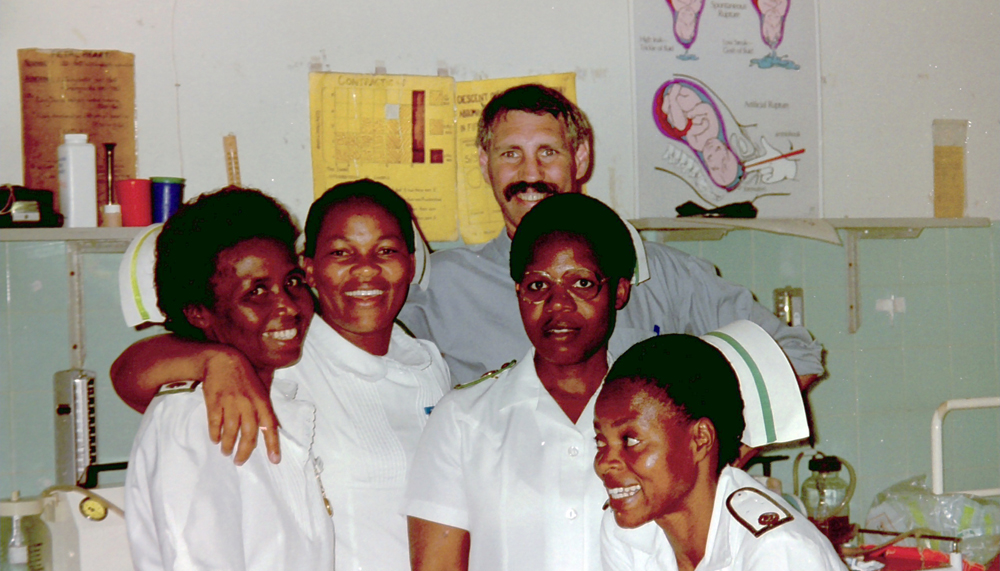Empathy pains

In The Pangolin Diary, a male midwife recounts his experiences in Africa.
“I remembered how afraid I was … of being alone and so far from home, of leaving my friends and family, of travelling to a new country and of known and unknown dangers. I wasn’t ready, on so many levels – a male midwife in Africa!”
The Pangolin Diary is David Stanley’s account of working for over two years as midwife and midwifery tutor in a rural mission hospital in central Zimbabwe.
The book gently starts with Stanley’s narration of how things unfolded. He had long dreamed of heading off to Africa, but when he got an unexpected call from the Australian Volunteers Board, he was in the middle of a personal crisis. Thus he was speaking through sobs and tears when he got to pick a date for his flight to Africa.
The narrative is packed with insights and accounts of gruelling experiences, such as when he had to drive a makeshift ambulance deep into the night to transport a woman who had given birth and was bleeding. The city hospital was 250km away, and when they got to the emergency room, no doctor attended to her. The next day, the woman died.
From the very first chapter, one can sense a compassionate and empathetic personality in the author as he injects moving and funny descriptions. His sensitivity to every detail of life makes him a fit storyteller for the hardships, joys, pains and hopes of a male midwife in a part of the world that is so disadvantaged compared with Australia.
Stanley, an associate professor at the University of Western Australia, shares that whilst some stories in the book are funny and many are sad, together they offer a range of perspectives on midwifery, healthcare and life in Zimbabwe.
“I started the book very soon after leaving Zimbabwe in 1997, but work and other issues always got in the way of my completing it,” he says. “But in 2011, I went with the WA Department of Health to Tanzania, together with Western Australian nurses, for a two-week international clinical visit and have been back in 2012 [and again this year]. It was this return to Africa that prompted me to get on with finishing the book.”
He realised that his experiences in Zimbabwe were not that dissimilar from his recent time in Tanzania. “I found myself relating stories about my midwifery volunteer experience and knew that if I had something in writing to offer the students and others, their experience could be enhanced,” he says.
He thought he might have something to say about overseas volunteer work, midwifery practice in other cultures or being a male in a female-dominated area of practice. His diary tackles the medical and social issues Zimbabwean women face as they grapple with the impact of HIV, AIDS and other medical conditions. More importantly, the book explores the dangers of working in what Stanley calls “a medically confronting, resource-poor, and overburdened health service”.
Many of his accounts show that not all women in Zimbabwe are able to deliver in the relative safety and comfort of hospitals, nor do they have professional midwifery care in their own homes.
In one of his accounts, Mrs Chikwekwete – not her real name – gave birth in a rural clinic not staffed by midwives. It was late evening and she had been in labour since the day before. She laid on her back panting for breath while fighting the pain in her mind.
When the sun had set, she was alone as the nurse had gone to aid another patient. She burned as the foetus forced its passage. The clinic was lighted only with paraffin light because there was no electricity. Flying ants whizzed through the open window and swarmed around the light. The nurse who returned was not a midwife, Stanley recounts, but out of necessity she had delivered many babies at the rural clinic. It was so dim that the nurse had to hold up the lamp with one hand. The bed beneath was wet with red and brown secretions. Soon the baby was born, but without a life.
The childless mother did not receive any comforting gestures, and she sobbed at the death of her firstborn baby.
With real-life stories such as this, Stanley offers insights and information to nurses and midwives who are contemplating an international clinical experience.
“The book is about the personal, professional and clinical challenges that volunteer health professionals may face and I try to offer insights through my experiences about being prepared, dealing with strange or new customs or cultures and language and coping in the face of very different clinical and health circumstances,” he says.
Stanley’s experiences have helped him learn much and grow as a professional and as a person, he says. And he hopes The Pangolin Diary will be of interest to anyone who’s into midwifery, nursing or international clinical experiences – or understanding others’ life journeys.
Nurses will find stories of clinical significance and descriptions of educational and clinical situations and how they were managed. Many incidents and stories are told from the perspective of the local women as they face the health and medical challenges in their poor, rural and remote locations.
Stanley considers all his midwife experiences wonderful but his favourites involve learning from the student and traditional midwives. In the preface, he recounts that when he was about to leave, the students presented him a wooden sculpture of a pangolin – a special animal in Zimbabwe offered to the chief, and he couldn’t be grateful enough for the gift or for being there.
Thus, The Pangolin Diary is also about the transition of the author’s life away from friends and family, as well as the building of friendships and special bonds far away from home.
Email: [email protected]





